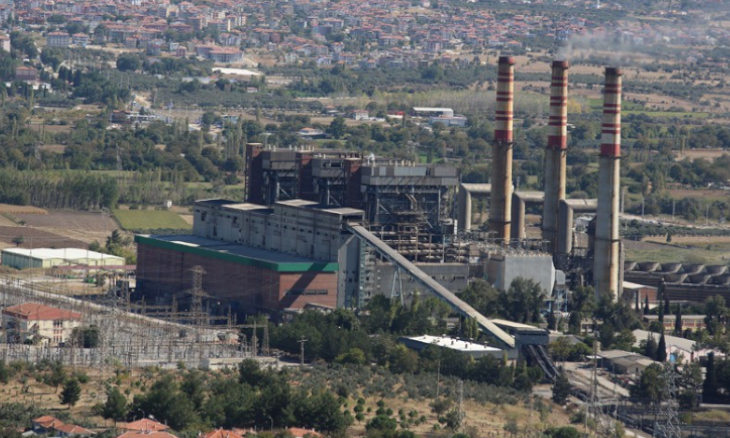Thermal power plants in Zonguldak and Muğla leave nearby villages without water in the middle of a pandemic
Elif Cansu İlhan writes: In the midst of the coronavirus outbreak in Turkey, people in some villages in the Aegean province of Muğla and the Black Sea province of Zonguldak are unable to regularly wash their hands because their water is frequently being cut due to the power plants in those regions. Generating electricity using lignite coal both requires heavy consumption of water and also pollutes below-ground water resources.
Elif Cansu İlhan
In the midst of this global health crisis, we are once again reminded of the importance of the most basic human rights, such as clean air and the access to food and clean water. The entrance to and from 31 provinces in Turkey, including the Black Sea province of Zonguldak, have been closed, and the people of Zonguldak, which has been suffocated by coal mines and thermal power plants for years, are now among those at risk for contracting the virus.
The virus has now spread to all of Turkey's cities. The biggest precaution against this global pandemic is washing one's hands. However, people in some villages in the Aegean province of Muğla (which can now be grouped with Zonguldak as a risk group for the same reason) are unable to regularly wash their hands because their water is frequently being cut.
When the thermal power plants in the districts of Milas and Yatağan and the mines that provided the plants with coal were privatized, the underground wells were transferred to the owners of the companies running the plants. In order for the plants to function, the companies first see that their reserves are filled up to 90 pct. and then they make sure that the villages have water. If the reserves aren't filled up to 90 percent, the villages don't get water. There are even court decisions that have enabled them to do this.

In Muğla, there are three thermal power plants, two in Milas and one in Yatağan. These three plants and the 13 open lignite mines that supply them with coal have been consuming Muğla ecologically and economically for 35 years. According to a report from Climate Action Network Europe, the price that the people of Muğla have paid for this coal is dear: 280 early deaths, 30,000 people displaced from their homes, 11,00 hectares of forestland destroyed.
Last week, as the pandemic continues to spread in Turkey, the water in the village of İkizköy was cut for two days. This is the water that 250-300 people use to drink, to water their guardians and for their animals.
“Along with Turkey and the rest of the world, we are also struggling against Covid-19. And at the moment when we need water the most, it has been cut for two days. We have animals, and if the water doesn't return today I don't know what we'll do,” said İkizköy resident Nejla Işık.
While people have are struggling to have their bills postponed due to the coronavirus, these plants aren't paying a cent for the water that they use, because during the privatization process the rights to use the well water was transferred to the companies that own the plants. Furthermore, when the State Hydraulic Works (DSİ) has warned people about shutting the faucet while washing their hands due to an increase in water consumption following the outbreak, the Yeniköy thermal power plant in one year consumed 2.5 times as much water as the district of Milas, which has a population of 132,000, and 7.5 times more than the 45,000 people in the district of Yatağan.
Generating electricity using lignite coal both requires heavy consumption of water and also pollutes below-ground water resources. Due to the plants, the levels of heavy metals in Muğla's water supply is very high. Apart from its high water consumption and pollution of water reserves, by changing the face of the earth in the region, it has resulted in a change in its hydrology, resulting in a depletion of its water resources.
“Since these coal mines began to be dug, we are losing our water. There used to be so much water, the water coming from this mosque watered all of the villages plains and fields, the vegetables and fruits we planted, everything. Nowadays everyone drinks bottled water at home. The water has decreased, and people aren't planting gardens like in the old days. Those with a well can, those without cannot. If they dig up (the 93 parcels of olive tree land that the thermal plant companies want to buy to build more coal mines) our water will be gone for good,” said Şerifan Abla of Yatağan's Turgut village.
Turkey, which lies in the Mediterranean Basin and has high climate fragility, is a country that is experiencing water stress. Due to the climate crisis, it is expected that half of the planet will be dealing with water stress by 2050. While calling on people to wash their hands for twenty seconds, they are also saying to turn off the faucet while soaping up your hands. Of course people should turn off the faucet, because water is natural wealth and no one has the right to consume uselessly. However, while people are counting their water by the seconds, coal mines and thermal power plants continue to trigger the health and climate crises while continuing to consume as much water as they want.
With COVID-19, we were able see the intensity of the struggle of the people living near the thermal plants much better. As with all crises, this global pandemic is striking the most fragile and poor segments of society. We will not allow thermal power plants to pollute our air, steal our water, trigger a climate crisis, and take our future away from us.
Author:
Elif Cansu İlhan is an energy and climate officer at Climate Action Network Europe (CAN).
